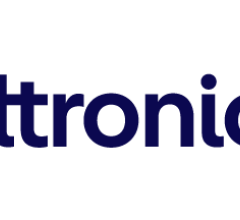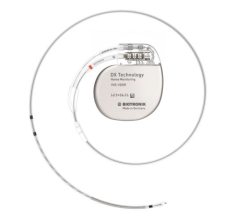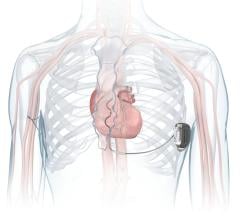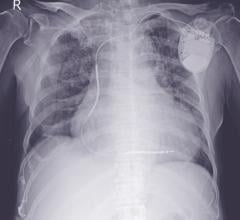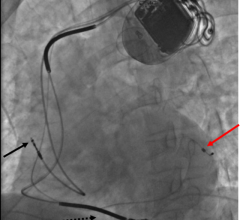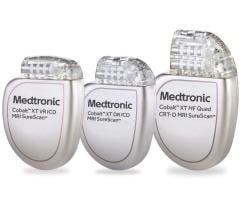April 11, 2007 — FDA has released the following Q&A from Boston Scientific Tuesday.
On April 5, Boston Scientific/Guidant recalled approximately 73,000 Implantable Cardiac Defibrillators (ICDs) and Cardiac Resynchronization Therapy Defibrillators (CRT-Ds). A faulty capacitor in these devices can cause the batteries to deplete sooner than expected. Most patients will not be affected by this recall, but patients with one of the recalled devices should contact their physicians about what steps to take next. Please see the questions below for additional information.
What exactly is affected by this Boston Scientific/Guidant recall?
Guidant is recalling approximately 73,000 Implantable Cardiac Defibrillators (ICDs) and Cardiac Resynchronization Therapy Defibrillators (CRT-Ds) that are distributed worldwide. The affected devices distributed in the US include the Contak Renewal 3 HE CRT-Ds (Models H177 and H179); Contak Renewal 3 CRT-Ds (Models H170 and H175); Vitality 2 DR ICDs (T165); Vitality 2 VR ICDs (T175); Vitality AVT ICDs (A155); Vitality DS DR ICDs (T125); and Vitality EL DR ICDs (T135). Guidant merged with Boston Scientific in April 2006.
What is the problem with these devices?
A capacitor in the affected devices could malfunction, leading to premature battery depletion.
How serious is this?
As of March 30, 2007, Boston Scientific has confirmed 19 field events with Guidant’s devices, mostly related to premature battery depletion. There were no serious injuries or deaths reported.
What should patients do who have one of the recalled devices?
FDA is aware that this news may cause patients to be concerned. The chance that a given patient is affected by this problem is very small. However, FDA will make sure patients have access to new information as it becomes available.
Patients who are unsure if they have a device affected by this recall should:
* Contact their physician;
* Contact Boston Scientific Technical Services at 1-800-CARDIAC;
* Go to Guidant’s Product Performance Resource Center web site at http://www.guidant.com/ppr/advis/2007_04_05.shtml. Patients will need to know the model and serial number of their device to use this web site.
Patients who have a device affected by this recall should consult with their physician on the next steps to take. A patient’s physician is in the best position to help decide what is best because physicians receive current information on these devices and also have access to the individual patient’s medical history.
Do the recalled devices need to be explanted (removed) from the patients?
No. In most cases, routine follow-up is all that will be required. In some cases, more frequent device checks may be advised. Only in rare cases, will a device need to be removed prematurely from a patient.
What are Boston Scientific’s recommendations for physicians?
If a patient has a device with a degraded capacitor, the time from implant to 2.65 volts (Middle of Life 2 / MOL2) will be reduced. To determine whether a patient may be at risk for a reduced ERI to EOL time, it is important to note when 2.65 volts (MOL2) was observed. For each patient:
1. Review patient records to assess battery voltage.
2. If battery voltage is above 2.65 volts (MOL2), continue to follow patient every three months per device labeling.
3. If battery voltage is at or below 2.65 volts (MOL2), determine the time between device implant and this observation.
* If the time from implant to 2.65 volts (MOL2) is greater than 27 months (Note: For VITALITY® EL / 2 EL / HE devices, this value is 32 months), the patient is not at risk for a shortened ERI to EOL time, and this advisory no longer applies.
* If the time from implant to 2.65 volts (MOL2) is 27 months or less (Note: for VITALITY EL / 2 EL / HE devices, this value is 32 months), the patient should be followed monthly until ERI. For devices that require monthly follow-up, replace the device within 30 days after ERI is displayed as ERI to EOL time may be shortened.
Note: In geographies where available, the LATITUDE® Patient Management System can facilitate patient monitoring and also provide automatic notification when the device reaches a battery status of ERI.
FDA is committed to immediately providing all important risk information we receive, as soon as we receive it. Physician feedback is very valuable to us. Please tell us what you are seeing and any concerns you have.
How is Guidant related to Boston Scientific?
Guidant Corp. merged with Boston Scientific Corp. on April 24, 2006. Guidant Corp. became the Cardiac Rhythm Management division of Boston Scientific Corp. The products being recall are labeled with the Guidant name.
When did FDA learn about this latest recall?
Boston Scientific notified FDA about the problem with these devices on March 23, 2007. On April 5, Boston Scientific issued a product advisory to physicians to alert them to the problem with the Guidant ICDs and CRT-Ds listed above and provide recommendations for patient treatment.
What will FDA do now?
FDA has determined that the product advisory constitutes a recall. FDA will be monitoring the recall to ensure that the firm’s actions are adequate to protect the public. FDA will ensure that information for patient care is made available. Information about the recall, and any updates, will be posted on FDA’s website
Does the current recall relate to Guidant's May 2006 recall?
The May 2006 recall involved problems with a faulty capacitor from the firm’s supplier. While the company’s current recall also deals with a faulty capacitor from the supplier, the failure modes and patient outcomes differ from those described in the May 2006 recall. Therefore, the current recall is being treated as a new recall and not as an extension of the May 2006 recall.
Does this recall mean Guidant still hasn’t corrected its problems?
FDA’s December 2006 inspection of Guidant indicated that the GMP issues previously cited by FDA appeared to have been adequately addressed. However, a GMP inspection evaluates a company’s systems at one point in time only and cannot necessarily predict how these systems will perform in the future. Therefore FDA will continue to look at individual Guidant products and recall patterns to ensure that quality systems remain in place to identify and address any problems that may occur in the future. FDA’s Quality System regulation requires firms to identify device problems both before and after distribution. When a problem is discovered, the firm must conduct an investigation commensurate with the significance and risk of the problem. These investigations can determine whether there is a problem, the extent of the problem, and how best to address it. This determination can be viewed as a Quality System that is working as intended.


 January 13, 2026
January 13, 2026 

